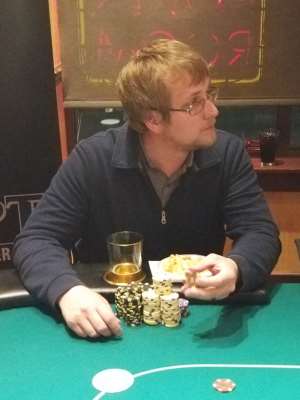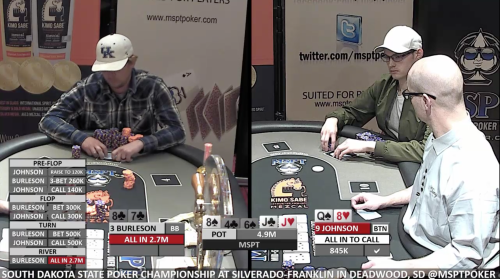
 Rick Burleson
Rick Burleson
.jpg) Aaron Johnson
Aaron Johnson
In the 2018 MSPT South Dakota State Poker Championship at Deadwood’s Silverado-Franklin Casino, the 286-entry field was down to the final two players when a big hand developed.
It began with the blinds at 30,000/60,000/10,000 when poker pro Aaron Johnson (1.8 million) raised to 120,000 on the button with the 
 and amateur Rick Burleson (3.7 million) three-bet to 260,000 holding the
and amateur Rick Burleson (3.7 million) three-bet to 260,000 holding the 
 .
.
When the flop came down 

 , Burleson bet 300,000 and Johnson called. The
, Burleson bet 300,000 and Johnson called. The  turn saw Burleson fire out 500,000 and again Johnson just called to see the
turn saw Burleson fire out 500,000 and again Johnson just called to see the  on the river. Burleson moved all in and Johnson tanked for roughly three minutes before folding the winner. He was left with 845,000 after the hand.
on the river. Burleson moved all in and Johnson tanked for roughly three minutes before folding the winner. He was left with 845,000 after the hand.
Ultimately, Burleson went on to win the tournament for $63,462 while Johnson finished as runner-up for $39,181. Had he made the call, chances are things would’ve went the other way. We consulted poker pro Jonathan Little of PokerCoaching.com about the hand.
MSPT: If you were in Burleson’s shoes, what would you have done on the flop and why?
Little: First off, I would essentially never three-bet 
 from out of position heads-up. It plays quite well as a call because it will be able to continue on many flops. Also, given the stack sizes, it is somewhat likely that Johnson will go all in over a three-bet, forcing 8-7 suited to fold away its equity, which is a bit of a disaster.
from out of position heads-up. It plays quite well as a call because it will be able to continue on many flops. Also, given the stack sizes, it is somewhat likely that Johnson will go all in over a three-bet, forcing 8-7 suited to fold away its equity, which is a bit of a disaster.
On the flop, I would tend to bet small, perhaps 200,000 into the 540,000 pot. This is an excellent flop for 8-7 and the main goal should be extracting value from worse made hands while forcing various over cards to either fold or make a speculative call. As you bet bigger, it becomes more difficult to get value from the worse made hands and the over cards will rarely make the mistake of calling.
MSPT: Same question regarding the turn?
Little: I would tend to check the turn. If you bet and get action, you will usually be against a better made hand or a hand that has a ton of outs, both of which are not great results. I think a much better play would be to check, looking to check-call a bet. I would have also checked the river to induce bluffs from busted draws.
MSPT: In your opinion, was the river decision a tough spot for Johnson?
 Little: I think Johnson had a fairly easy call on the river. When all of the draws miss, you simply cannot fold your best made hands. Johnson should realize in this spot that his Q-8 is one of the best hands in his range. The only justification for this fold would be if he thinks Burleson essentially never bluffs or overvalues a worse made hand. He probably had some sort of read that Burleson liked his hand, which he did. It just so happened that he thought he was vastly overvaluing his decent, but non-nut pair.
Little: I think Johnson had a fairly easy call on the river. When all of the draws miss, you simply cannot fold your best made hands. Johnson should realize in this spot that his Q-8 is one of the best hands in his range. The only justification for this fold would be if he thinks Burleson essentially never bluffs or overvalues a worse made hand. He probably had some sort of read that Burleson liked his hand, which he did. It just so happened that he thought he was vastly overvaluing his decent, but non-nut pair.
MSPT: Johnson seemed to believe that, while he was down in chips, he had the experience and knowledge advantage. By folding, he was still left with 14 bb and likely figured he could find a better spot.
Little: With 14 big blinds, unless your opponent is horrible, if you have an edge, it will be minuscule. You should generally look to avoid close spots if you think you will have many better spots in the future. With 14 big blinds heads-up, it is quite optimistic to think you have lots of time to slowly grind away your opponent.
Most of the time, you will be all in within the next few hands, meaning the idea of "waiting for a better spot" essentially does not apply. This concept mainly applies to heads-up poker when you are playing with very deep stacks and your opponent is either extremely tight/passive (you can slowly blind them down) or overly loose/aggressive (you can frequently bluff catch for lots of chips).
PokerCoaching.com is an interactive poker learning experience from two-time WPT Champion Jonathan Little. Try it for free at PokerCoaching.com/mspt.